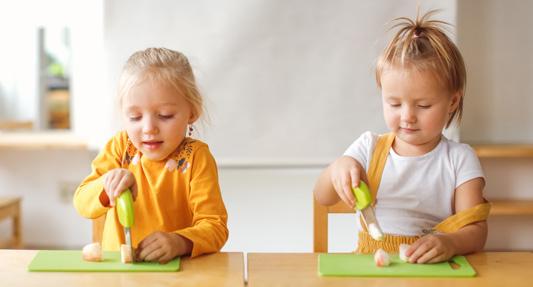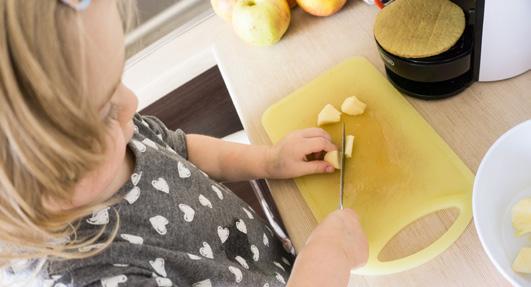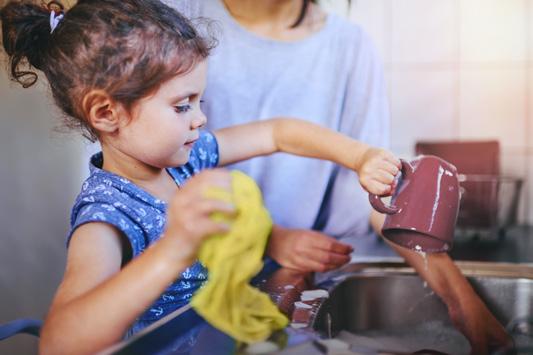
5 minute read
LUNCH BOXES & Learning

Building Independence Through Daily Routines
Montessori education, every experience—no matter how small—is an opportunity to build independence, responsibility, and confidence. That includes the daily tasks we might otherwise rush through, like getting dressed, preparing a lunchbox, or packing a backpack.
At first glance, these routines might seem trivial compared to academic lessons. But in Montessori, they are seen as essential parts of a child’s development. When children are encouraged to take ownership of these everyday responsibilities, they gain more than just practical skills— they develop habits of self-reliance that shape how they approach learning, relationships, and life itself.
The Power of Practical Life
Montessori classrooms include an entire area dedicated to Practical Life activities, such as pouring, cutting, cleaning, and food preparation. These activities help children develop:
• Coordination: Fine-motor skills that support writing and other academic tasks.
• Order and Sequencing: Understanding steps in a process—from washing hands before a meal to organizing materials for a project.
• Concentration: The ability to focus deeply on purposeful tasks.
• Independence: A growing sense of “I can do it myself!” that spills over into all areas of life.
When children practice these skills at home—through dressing themselves, packing their lunch, or helping with meal prep—they reinforce the same capacities nurtured in the classroom.
Packing the Lunchbox: A Lesson in Choice and Responsibility
Instead of quickly packing your child’s lunch for them, consider inviting your child to help—or even take the lead. For younger children, this might mean choosing from a set of options you provide (Would you like apple slices or grapes today?). Older children can help assemble sandwiches, portion snacks, and even plan the menu for the week.
Through packing their own lunch, children learn:
• Planning: Deciding what to include requires thinking ahead.
• Nutrition: They start to understand what makes a balanced meal.
• Self-Care: Choosing foods they enjoy encourages mindfulness about what nourishes their bodies.
• Pride in Preparation: When a child eats a lunch they helped prepare, it often tastes better simply because they had a hand in making it.

Dressing for Success: More Than Just Clothes
Getting dressed might seem like a small task, but for a child, it’s a big step toward autonomy. Montessori teachers encourage children to dress themselves from an early age, using clothing that’s easy to manage, like elastic waistbands, large buttons, and simple fasteners.
At home, giving your child time to dress themselves each morning sends a powerful message: I believe in your ability to care for yourself.
This simple routine helps children develop:
• Fine-motor skills (zipping, buttoning, tying),
• Decision-making skills (choosing weather-appropriate clothing),
• Time awareness (getting ready within a timeframe),
• Confidence and competence. It may take longer at first—and it can be tempting to jump in when the clock is ticking—but that extra time is an investment in your child’s growing self-sufficiency.
Building a little bit of extra time into the activity decreases tension on both sides.
Small Tasks, Big Life Skills
Each of these daily routines—dressing, packing lunch, getting out the door on time—builds layers of important life skills:
• Sequencing: Understanding the order in which things need to happen.
• Personal Responsibility: Knowing they are capable of managing their own needs.
• Problem-Solving: Figuring out how to open tricky lunch containers or adapt to a forgotten item.
• Self-Confidence: Feeling proud of their ability to care for themselves.
And perhaps most importantly, these routines build executive function—the mental skills that help us plan, focus attention, remember instructions, and juggle multiple tasks. These are critical for success not only in school but throughout life.

How Parents Can Support Independence at Home
• Create a Child-Friendly Setup: Use low hooks, step stools, and accessible shelves so your child can reach their clothes, lunch supplies, and backpack.
• Allow Time: Start the morning a bit earlier to give your child time to complete tasks without rushing.
• Offer Choices: Guide your child by offering limited, appropriate choices (e.g., “Would you like the blue shirt or the red one?”).
• Be Patient: Mastery takes time and repetition. Focus on progress, not perfection.
• Model and Teach: Show your child how to do a task, then step back and let them try.
Independence: A Gift That Lasts
When we slow down and invite children to participate in daily routines, we’re not just saving a few minutes for ourselves—we’re empowering them for life. These small, everyday tasks build the mindset and abilities that help
Montessori children become capable, thoughtful, and self-directed learners.
So the next time your child zips up their jacket or carefully places their sandwich in their lunchbox, know that they’re not just getting ready for the day—they’re preparing for life.

• Allow Time: Start the morning a bit earlier to give your child time to complete tasks without rushing.
• Offer Choices: Guide your child by offering limited, appropriate choices (e.g., “Would you like the blue shirt or the red one?”).
• Be Patient: Mastery takes time and repetition. Focus on progress, not perfection.
• Model and Teach: Show your child how to do a task, then step back and let them try.
Independence: A Gift That Lasts
When we slow down and invite children to participate in daily routines, we’re not just saving a few minutes for ourselves—we’re empowering them for life. These small, everyday tasks build the mindset and abilities that help
Montessori children become capable, thoughtful, and self-directed learners.
So the next time your child zips up their jacket or carefully places their sandwich in their lunchbox, know that they’re not just getting ready for the day—they’re preparing for life.








